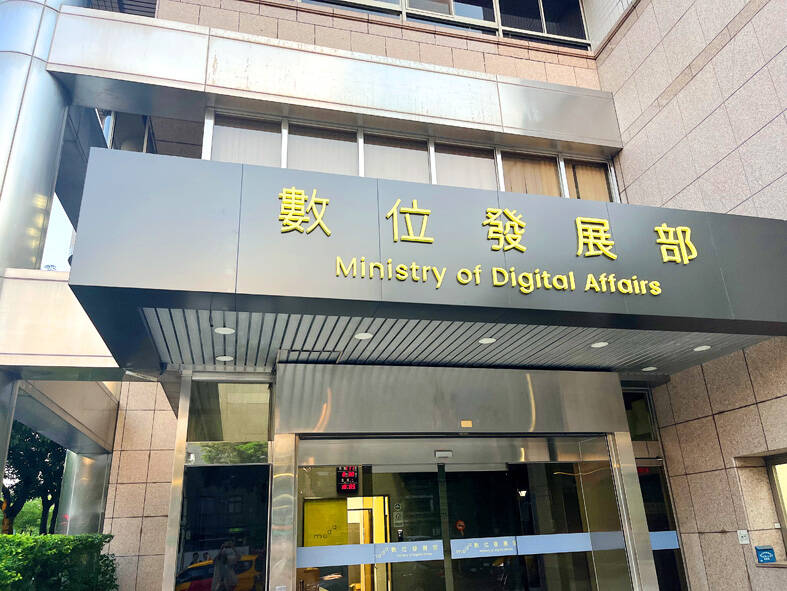The Ministry of Digital Affairs on Friday announced that it has selected the Telecom Technology Center (TTC) to head a project to improve the resilience of the nation’s digital communications network.
The ministry said it had asked research and academic institutions to submit proposals on “response or wartime applications of new technology to strengthen digital communications resilience,” including through the use of non-geostationary satellite Internet.
Following deliberations by ministry-associated academics, it on Friday announced that it had signed a contract with the TTC on Thursday and granted the budget for the project to the center.

Photo: Hsu Tzu-ling, Taipei Times
Under the terms of the contract, the TTC is required to set up 11 terminals for non-geostationary satellite Internet and five links for cellular satellite backhauls across Taiwan by the end of the year.
The TTC must also establish 21 satellite Internet terminals and nine backhaul links in Taiwan, along with one terminal in a foreign country for testing purposes by the end of the first quarter of next year.
In total, the center is to set up more than 700 domestic terminals, three overseas terminals and 70 links by the end of next year, the ministry said.
The infrastructure would likely first be installed in outlying counties and places lacking diverse wireless network gateways, it said.
The project would also stress test the emergency application capabilities of disaster warning systems, roaming functionality and information security infrastructure, it added.
This is designed to ensure that the government can retain considerable communication capabilities during times of disaster or war.
It said it encouraged non-geostationary satellite systems equipment providers to seek partnership opportunities with the TTC.
The ministry also addressed a Bloomberg report that said Taiwan would need low Earth orbit satellite networks to maintain Internet connectivity in the event of a Chinese invasion.
As telecommunications companies providing such networks are required to have no Chinese investment — and less than 49 percent direct foreign ownership or 60 percent indirect foreign shareholders — most current suppliers would be ineligible, the ministry said.
While foreign companies might still provide satellite communications by working with a domestic telecom to bypass the Telecommunications Management Act (電信管理法), the ministry would still have to heavily scrutinize such companies when approving rights to Taiwan’s radio frequencies.
The firms would have to be strictly examined by national security and cross-strait agencies to guarantee that satellite providers working with domestic telecoms are not controlled by the Chinese government, it said.

The Grand Hotel Taipei on Saturday confirmed that its information system had been illegally accessed and expressed its deepest apologies for the concern it has caused its customers, adding that the issue is being investigated by the Ministry of Justice Investigation Bureau. The hotel said that on Tuesday last week, it had discovered an external illegal intrusion into its information system. An initial digital forensic investigation confirmed that parts of the system had been accessed, it said, adding that the possibility that some customer data were stolen and leaked could not be ruled out. The actual scope and content of the affected data

‘LIKE-MINDED PARTNER’: Tako van Popta said it would be inappropriate to delay signing the deal with Taiwan because of China, adding he would promote the issue Canadian senators have stressed Taiwan’s importance for international trade and expressed enthusiasm for ensuring the Taiwan-Canada trade cooperation framework agreement is implemented this year. Representative to Canada Harry Tseng (曾厚仁) in an interview with the Central News Agency (CNA) said he was increasingly uneasy about Ottawa’s delays in signing the agreement, especially as Ottawa has warmed toward Beijing. There are “no negotiations left. Not only [is it] initialed, we have three versions of the text ready: English, French and Mandarin,” Tseng said. “That tells you how close we are to the final signature.” Tseng said that he hoped Canadian Prime Minister Mark Carney

President William Lai (賴清德) yesterday bestowed one of Taiwan’s highest honors on Saint Vincent and the Grenadines (SVG) Ambassador Andrea Clare Bowman in recognition of her contributions to bilateral ties. “By conferring the Order of Brilliant Star with Grand Cordon on Ambassador Bowman today, I want to sincerely thank her, on behalf of the Taiwanese people, for her outstanding contribution to deepening diplomatic ties between Taiwan and SVG,” Lai said at a ceremony held at the Presidential Office in Taipei. He noted that Bowman became SVG’s first ambassador to Taiwan in 2019 and

POSITIVE DEVELOPMENT: Japan and the US are expected to hold in-depth discussions on Taiwan-related issues during the meeting next month, Japanese sources said The holding of a Japan-US leaders’ meeting ahead of US President Donald Trump’s visit to China is positive news for Taiwan, former Japan-Taiwan Exchange Association representative Hiroyasu Izumi said yesterday. After the Liberal Democratic Party’s landslide victory in Japan’s House of Representatives election, Japanese Prime Minister Sanae Takaichi is scheduled to visit the US next month, where she is to meet with Trump ahead of the US president’s planned visit to China from March 31 to April 2 for a meeting with Chinese President Xi Jinping (習近平). Japan and the US are expected to hold in-depth discussions on Taiwan-related issues during the